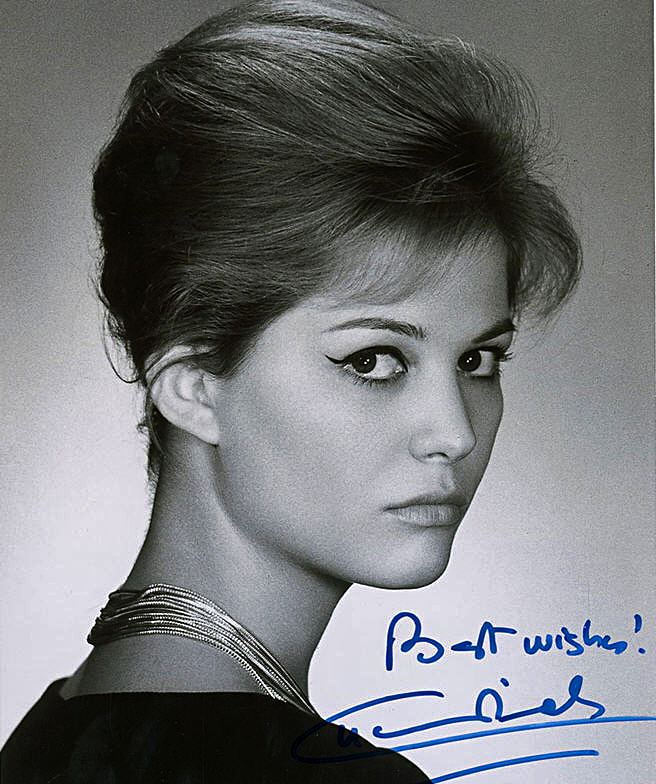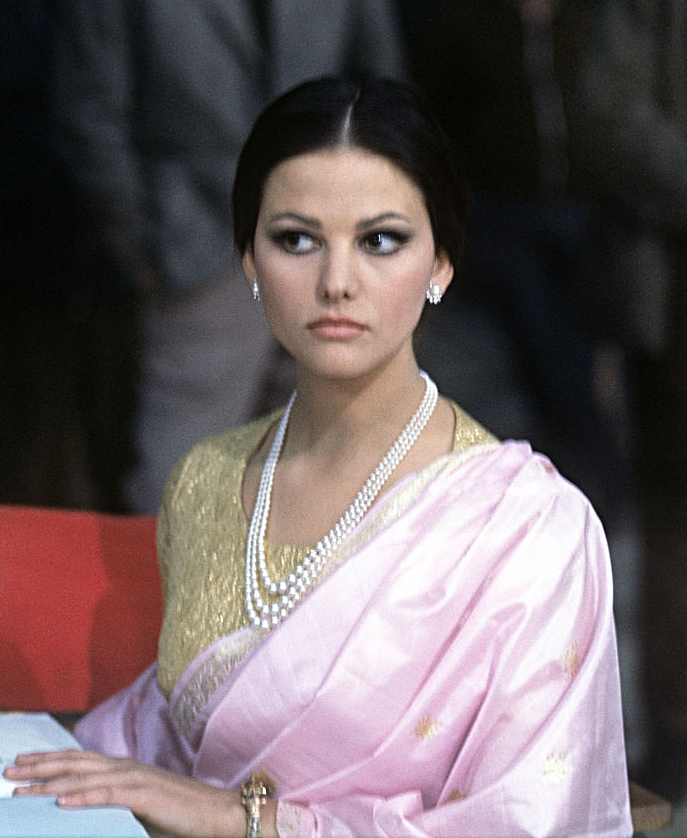Friday, 14 August 2015
Claudia Cardinale (conceived 15 April 1938) is an Italian film performing artist. She showed up in probably the most acclaimed European movies of the 1960s and 1970s, essentially Italian or French, additionally in a few English movies.
Brought up in Tunis, Cardinale won the "Most Beautiful Italian Girl in Tunisia" rivalry in 1957, the prize being an outing to Italy which immediately prompted film contracts, thanks most importantly to the contribution of Franco Cristaldi, who went about as her coach for various years and later wedded her. In the wake of making her introduction in a minor part with Omar Sharif in Goha (1958), Cardinale turned into one of the best known on-screen characters in Italy after parts in movies, for example, Rocco and His Brothers (1960), Girl with a Suitcase (1961), The Leopard (1963), Cartouche (1963) and Federico Fellini's 8½ (1963).[a] From 1963, Cardinale got to be known in the United States and Britain tailing her part in The Pink Panther inverse David Niven. For quite a while she showed up in Hollywood movies, for example, Blindfold (1965) inverse Rock Hudson, Lost Command (1966), The Professionals (1966), The Hell with Heroes (1968) and the Sergio Leone epic western Once Upon a Time in the West (1968), a joint US-Italian creation, in which she was adulated for her part as a previous whore inverse Jason Robards and Henry Fonda.
 Bored with the Hollywood film industry and not having any desire to turn into an adage, Cardinale came back to Italian and French silver screen, and gathered the David di Donatello for Best Actress honor for her parts in Il giorno della civetta (1968) and as a whore close by Alberto Sordi in A Girl in Australia (1971). In 1974, Cardinale met executive Pasquale Squitieri, who might turn into her spouse, and she habitually highlighted in his movies, including I guappi (1974), Corleone (1978) and Claretta (1984), the recent of which won her the Nastro d'Argento Award for Best Actress. In 1982 she played the adoration enthusiasm of Klaus Kinski in Werner Herzog's Fitzcarraldo, who raises the trusts to purchase him a steamship in South America. In 2010, Cardinale got the Actress Award at the 47th Antalya "Brilliant Orange" International Film Festival for her execution as an elderly Italian lady who takes in a youthful Turkish trade understudy in Signora Enrica.
Bored with the Hollywood film industry and not having any desire to turn into an adage, Cardinale came back to Italian and French silver screen, and gathered the David di Donatello for Best Actress honor for her parts in Il giorno della civetta (1968) and as a whore close by Alberto Sordi in A Girl in Australia (1971). In 1974, Cardinale met executive Pasquale Squitieri, who might turn into her spouse, and she habitually highlighted in his movies, including I guappi (1974), Corleone (1978) and Claretta (1984), the recent of which won her the Nastro d'Argento Award for Best Actress. In 1982 she played the adoration enthusiasm of Klaus Kinski in Werner Herzog's Fitzcarraldo, who raises the trusts to purchase him a steamship in South America. In 2010, Cardinale got the Actress Award at the 47th Antalya "Brilliant Orange" International Film Festival for her execution as an elderly Italian lady who takes in a youthful Turkish trade understudy in Signora Enrica.
Frank on ladies' rights causes throughout the years, Cardinale has been an UNESCO goodwill diplomat for the Defense of Women's Rights since March 2000. In February 2011 the Los Angeles Times Magazine named Cardinale among the 50 most wonderful ladies in film history
Cardinale was instructed at the Saint-Joseph-de-l'Apparition school of Carthage which she went to alongside her more youthful sister Blanche. She then learned at the Paul Cambon School, where she graduated with the expectation of turning into a teacher. As an adolescent she was portrayed as "noiseless, unusual, and wild", and like different young ladies of her era was interested by Brigitte Bardot who came to unmistakable quality in the 1956 film And God Created Woman, coordinated by Roger Vadi
TO KNOW MORE ABOUT Claudia Cardinale CLICK https://en.wikipedia.org/wiki/Claudia_Cardinale
Brought up in Tunis, Cardinale won the "Most Beautiful Italian Girl in Tunisia" rivalry in 1957, the prize being an outing to Italy which immediately prompted film contracts, thanks most importantly to the contribution of Franco Cristaldi, who went about as her coach for various years and later wedded her. In the wake of making her introduction in a minor part with Omar Sharif in Goha (1958), Cardinale turned into one of the best known on-screen characters in Italy after parts in movies, for example, Rocco and His Brothers (1960), Girl with a Suitcase (1961), The Leopard (1963), Cartouche (1963) and Federico Fellini's 8½ (1963).[a] From 1963, Cardinale got to be known in the United States and Britain tailing her part in The Pink Panther inverse David Niven. For quite a while she showed up in Hollywood movies, for example, Blindfold (1965) inverse Rock Hudson, Lost Command (1966), The Professionals (1966), The Hell with Heroes (1968) and the Sergio Leone epic western Once Upon a Time in the West (1968), a joint US-Italian creation, in which she was adulated for her part as a previous whore inverse Jason Robards and Henry Fonda.
 Bored with the Hollywood film industry and not having any desire to turn into an adage, Cardinale came back to Italian and French silver screen, and gathered the David di Donatello for Best Actress honor for her parts in Il giorno della civetta (1968) and as a whore close by Alberto Sordi in A Girl in Australia (1971). In 1974, Cardinale met executive Pasquale Squitieri, who might turn into her spouse, and she habitually highlighted in his movies, including I guappi (1974), Corleone (1978) and Claretta (1984), the recent of which won her the Nastro d'Argento Award for Best Actress. In 1982 she played the adoration enthusiasm of Klaus Kinski in Werner Herzog's Fitzcarraldo, who raises the trusts to purchase him a steamship in South America. In 2010, Cardinale got the Actress Award at the 47th Antalya "Brilliant Orange" International Film Festival for her execution as an elderly Italian lady who takes in a youthful Turkish trade understudy in Signora Enrica.
Bored with the Hollywood film industry and not having any desire to turn into an adage, Cardinale came back to Italian and French silver screen, and gathered the David di Donatello for Best Actress honor for her parts in Il giorno della civetta (1968) and as a whore close by Alberto Sordi in A Girl in Australia (1971). In 1974, Cardinale met executive Pasquale Squitieri, who might turn into her spouse, and she habitually highlighted in his movies, including I guappi (1974), Corleone (1978) and Claretta (1984), the recent of which won her the Nastro d'Argento Award for Best Actress. In 1982 she played the adoration enthusiasm of Klaus Kinski in Werner Herzog's Fitzcarraldo, who raises the trusts to purchase him a steamship in South America. In 2010, Cardinale got the Actress Award at the 47th Antalya "Brilliant Orange" International Film Festival for her execution as an elderly Italian lady who takes in a youthful Turkish trade understudy in Signora Enrica.Frank on ladies' rights causes throughout the years, Cardinale has been an UNESCO goodwill diplomat for the Defense of Women's Rights since March 2000. In February 2011 the Los Angeles Times Magazine named Cardinale among the 50 most wonderful ladies in film history
Early life
Claudia Cardinale was conceived Claude Joséphine Rose Cardinale in La Goulette, an area of Tunis, French protectorate of Tunisia on 15 April 1938. Her mom, Yolande Greco, was conceived in Tunisia to Sicilian displaced people from Trapani. Her maternal grandparents had a little shipbuilding firm in Trapani however later settled in La Goulette, where there was a substantial Italian group. Her dad, Francesco Cardinale, was a railroad laborer, conceived in Gela. Her local dialects were French, Tunisian Arabic, and the Sicilian dialect of her guardians. She didn't figure out how to communicate in Italian until she had as of now started to be thrown for Italian films.Cardinale was instructed at the Saint-Joseph-de-l'Apparition school of Carthage which she went to alongside her more youthful sister Blanche. She then learned at the Paul Cambon School, where she graduated with the expectation of turning into a teacher. As an adolescent she was portrayed as "noiseless, unusual, and wild", and like different young ladies of her era was interested by Brigitte Bardot who came to unmistakable quality in the 1956 film And God Created Woman, coordinated by Roger Vadi
TO KNOW MORE ABOUT Claudia Cardinale CLICK https://en.wikipedia.org/wiki/Claudia_Cardinale


0 comments:
Post a Comment